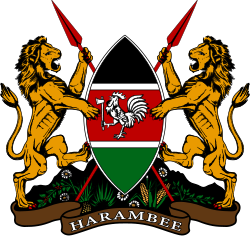| Finance Bill, 2024 | |
|---|---|
 | |
| Parliament of Kenya | |
| |
| Considered by | National Assembly (Kenya) |
| Signed | 27 June 2024 (prospective) |
| Vetoed by | William Ruto |
| Vetoed | 26 June 2024 |
| Legislative history | |
| Bill citation | National Assembly Bills No. 30 |
| Introduced by | Cabinet Secretary for the National Treasury and Economic Planning |
| Introduced | 9 May 2024 |
| Second reading | 20 June 2024 |
| Third reading | 24 June 2024 |
| Status: Not passed | |
The Finance Bill, 2024 was a legislative bill that proposed changes to the tax system of Kenya, [1] which involves tax increases. [2] The proposed bill aims to raise 346 billion Kenyan shillings (KSh) to pay off debt and fund development projects. [2] [3] It was first introduced in May 2024 and has been controversial, [4] with some provisions facing public outcry. [5] [6] [7] [8] The proposal sparked the Kenya Finance Bill protests and public opposition. [9] [10] On 25 June 2024, Parliament approved the Finance Bill despite ongoing protests; however, President William Ruto declined to sign it into law the following day after an assault incident in the Parliament of Kenya. [11] [12] [13]
Contents
- Background
- Provisions
- Series
- First reading
- Amendments
- Second reading
- Third reading and storming of the Parliament
- References
- External links
On 28 June, President Ruto rejected the Finance Bill and ordered a KSh 999 billion budget cut. Concurrently, he signed the "Appropriations Bill 2024" into law. These budget cuts impacted national and county governments, including the executive, legislature, judiciary, and constitutional commissions. The National Treasury was instructed to prepare supplementary estimates to reflect these reductions and limit spending to essential services. Ruto emphasized that these measures were necessary to offset the revenue shortfall caused by the rejection of the Finance Bill. [14]